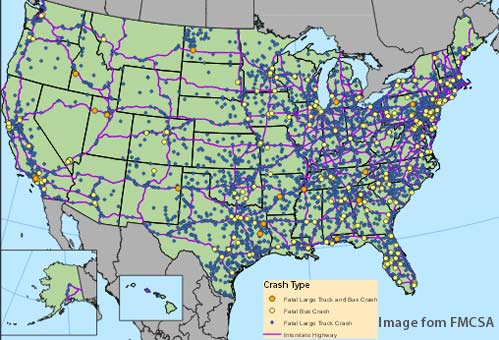“Death rates are rising even as Congress is caving to trucking industry pressure and loosening regulations.” —Attorney Fred Pritzker
The rising traffic fatalities involving large commercial trucks was the topic of a recent New York Times article, “The Trucks are Killing Us,” written by Howard Abramson. The article begins:
“ACCIDENTS like the one that critically injured the comedian Tracy Morgan, killed his friend and fellow comedian James McNair, known as Jimmy Mack, and hurt eight others on the New Jersey Turnpike last year are going to continue to happen unless Congress stops coddling the trucking industry.”
This month, the National Transportation Safety Board (NTSB) released information about the tragic accident involving Tracy Morgan, James McNair and others. NTSB determined that “the probable cause of the accident near Cranbury, New Jersey, involving a truck, a limo van, and four other vehicles, was the truck driver’s fatigue, which resulted in his delayed braking to avoid traffic that was slowing and stopped for an active work zone. Also causal to the accident was the driver’s operation of the truck at a speed in excess of the posted limit for the work zone area.”
In 2013, the most recent year with complete data, there were 3,541 fatal crashes involving large trucks, and 3,964 people died in those crashes, according to the Federal Motor Carrier Safety Administration (FMCSA). Those numbers are rising annually. In 2011, there were 3,365 fatal crashes involving large trucks, and 3,781 people killed in those crashes. \

Congress should be taking action to stop this trend, but instead, it is taking action to make our roads less safe. On July 30, the Senate passed a 6-year transportation bill, Developing a Reliable and Innovative Vision for the Economy Act (DRIVE ACT). In addition to providing needed highway construction and maintenance funding, it takes some big steps backwards in the are of traffic safety:
- It allows for the minimum age for commercial truck drivers to go from 21 to 18 (DRIVE Act, Section 32403(a)(1) and (2)). Even if a federal “pilot program” to lower the age does not get off the ground or is stalled, states can enter into interstate compacts to allow the lower minimum driving age.
- Section 32608(b) of the Act puts roadblocks in the way of the use of wireless roadside inspection systems, which could be used to find more unsafe drivers and get them off of the road.
- Section 32201 provides for broad exemptions from the hours of service regulations, 49 CFR 395. These regulations limit the amount of time a truck driver can be on the road.

And most disturbing is an attempt in this bill to prevent injured motorists and their families from getting their day in court. Section 32005 (e)(2 and 3) of the Act would have FMCSA, a federal agency, determine fault instead of a court of law. It requires FMCSA to create a “demonstration program” that allows trucking companies and drivers to request a review of crashes, and, if FMCSA determines the company and driver are not responsible (not at fault) for the crash, information about the crash “shall not be admitted as evidence or otherwise used in a civil action.”
We have handled cases where the evidence initially suggested the truck driver was not at fault, and we kept digging until we uncovered all of the evidence, much of which proved the truck driver was at fault. It took an independent investigation by attorneys to find the truth. Section 32005 would be totally one sided, with the trucking companies advocating for zero fault and no one advocating for those injured in these crashes and the families of those killed.